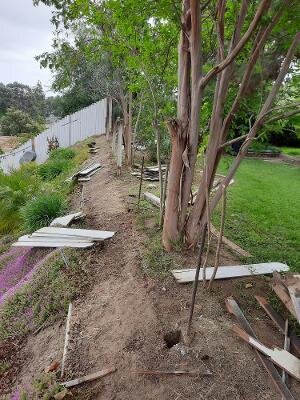Not long after we moved to Temecula in 1988, the neighbor above us installed a cedar fence at the top of our slope on the property line. A pretty nice job too! As it aged over the years, we did some minor repairs—putting in supports for some posts, laying new 2X4s above some broken rails, and replacing some pickets. But about a year ago I realized it needed more major repairs. Three of the seven posts had rotted out, more rails needed replacing, and 40 of the 120 pickets had to be replaced. A fairly normal job, until I began working on it. All the rails were bad, as were all of the pickets, and without the pickets to support it, another posts turned out to be loose. Really, all was taken out except three posts. And it turns out Fred didn’t make them all in line nor the same height.
Just over three full days of working got the job done, with some blood, sweat, and dollars expended. I pray it will last longer than Sheila and I. And as I try to do so often, I couldn’t help but see a spiritual lesson and thought of Paul’s advice, “Test yourselves to make sure you are solid in the faith. Don’t drift along taking everything for granted. Give yourselves regular checkups. You need firsthand evidence, not mere hearsay, that Jesus Christ is in you. Test it out. If you fail the test, do something about it” (2 Corinthians 13:5, The Message).
We’re physical and finite and often in need of repair, as is our world. Stuff wears out. Becomes less functional. We change, both for good and bad. These traits involve our connection with God, our relationships, our ministries, how we use our time. And to exemplify that, my crankiness had been growing, and my normally sweet and gentle spirit needed some repair. OK, you can stop laughing. But I AM working on fixing this.
Paul encouraged us to regularly examine ourselves to find areas in need of repair. So, taken straight from repairing 65 feet of fence, here come some tips.
1. Assess the functionality of the key areas of your life. Be honest in looking at yourself, maybe bring some others into the process. Be frank about the level of seriousness and needed repair.
2. Craft a plan, including the costs. Realize unexpected costs can arise, like my bloody arm.
3. As you get into the repairs, remember the military term, “No battle plan survives contact with the enemy. Redraw your plans if needed. I need some words of “encouragement” from my wife here to do a more thorough job—my tendency is to take shortcuts.
4. Finish it. Don’t get sidetracked or lazy. I had to put writing on my family memoir novel on hold for 4 days of work and a day of healing, but I’m glad.
5. Enjoy the fruits of your labor. Take some looks. Smile. Take genuine pride in doing a good and needed job.
Kick Starting the Application
Carve out some quiet time, and prayerfully ask God to point out some areas in need of repair. Prioritize them in order of seriousness, and include this in prayer too. I suggest starting with just one, get a sense of completion, then move to the next. Consider sharing this process with someone else to help keep you on track. Last, enjoy the process!


